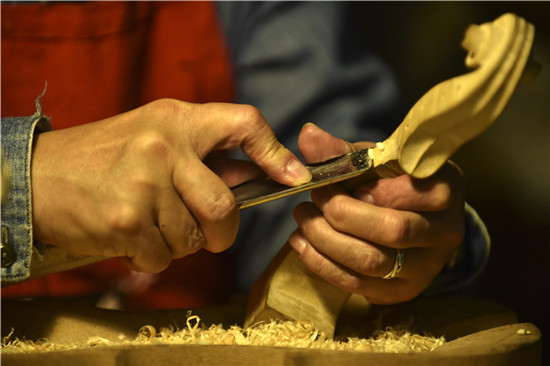 |
|
Wang carves a violin head at his workshop. LI YI/XINHUA |
In 1976, a devastating earthquake struck neighboring Tangshan. Wang and his fellow workers moved into tents, where his violin cracked after days in the cold.
"I was depressed as my family had no spare money for a second one," he said.
So he resolved to make his own using an awl, a file and sharp pieces of glass, which he found to be a good tool to form curves in the wood. "I kept smashing glass until I found the ideal shard shape."
In making the violin, he had no instructor and only his broken one as an example, so it took him six months to finish.
Wang took the college entrance exam in the late 1970s, one of two applicants for a single vacancy at a violin-making major at Beijing's Central Conservatory of Music, and he failed.
While he was preparing to retake the exam the following year, Tianjin Opera and Dance Theater advertised for an instrument repairman for its symphony orchestra. "Few people could have done it," he said.
Wang got the job when the municipal bureau of culture had his rural hukou (residential registration) converted to an urban one. Over the following 16 years, he repaired instruments at the theater, and became a self-taught master.
Since China opened its doors to the outside world in 1978, many people have traveled overseas. Wang wanted to join them to find out more about Western instruments and the skills involved in making them, but it would take him nearly two decades to do so.
Wang finally went to the United States in 1997, when a former apprentice of his found him a job at a music center in Washington.
Upon arrival, he was amazed by the high-rises and homes there.
But when he reached the music center, he had trouble gaining the confidence of his new colleagues at first.
"In the beginning, few thought a Chinese could fix a Western instrument ... that is, until I repaired a completely broken violin that none of them had even tried to repair," Wang said.
Over the next decade, he worked with many top musicians and repaired thousands of violins in Washington.
He said he was surprised by the concert customs in the US. He once went to a symphony concert in casual clothes, only to find others were all in suits.
"The formal dress shows their respect for the music and is due to their education since childhood," he said.
Wang came back to China to look after his ailing mother in 2007. He was as surprised as he was when he first landed in the US by the emerging high-end violin market in his home country.
China's expanding middle class has created a lucrative market for quality products, and a growing number of parents enroll their children in music and dance classes.
"In the past, few parents cared about anything other than academic performance," he said.
Wang now runs a workshop in Tianjin that makes no more than 20 violins a year, all commissioned. His son works in IT and is unlikely to learn violin making.
"China has become the world's largest violin producer. There are many people looking for quality violins," Wang said. "I will teach whoever is interested."

 Daily life
Daily life




